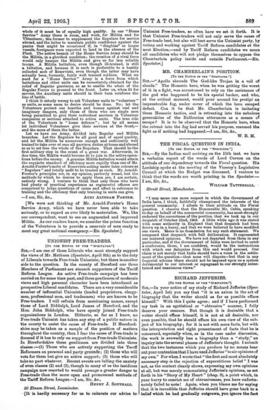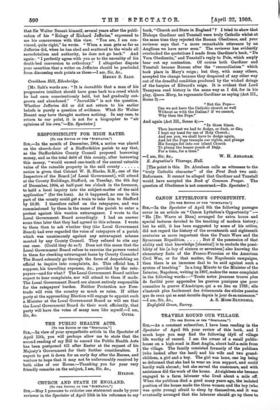RICHARD JEFFERIES.
[TO THE EDITOR OF THE "SPECTATOR:1
Sin,—In your notice of my study of Richard Jefferies (Spec- tator, April 1st) you say that "it is an axiom in the art of biography that the writer should as far as possible efface himself." With this I quite agree ; and if I have performed my task in an egotistical or " obtrusive " manner, I fully deserve your censure. But though it is deeirable that a writer should efface himself, it is not at all desirable, nor even possible, that he should efface his own view of the sub- ject of his biography ; for it is not with mere facts, but with the interpretation and right presentment of facts that he is concerned, especially when, as in the case under discussion, the work is avowedly less a biography than a "study," an inquiry into the several phases of Jefferies's thought. I submit that the two instances which you produce by no means bear Out your contention that I have used Jefferies "to air opinions of my own." For when I wrote that" the first and most absolutely necessary step is the rejection of superstitious belief" I was not, as the context clearly shows, expressing my own opinions at all, but was merely summarising Jefferies's opinions, as set forth in his "Story of My Heart" (chap. 9), a point which, in your hurry to convict me of obtrusiveness, you have unfortu- nately failed to note! Again, when you blame me for saying that it is incredible that Jefferies should have gone back to a belief which he had gradually outgrown, you ignore the fact
that Sir Walter Besant himself, several years after the publi- cation of his "Eulogy of Richard Jefferies," expressed to me his concurrence with this view. "You are, I am con- vinced, quite right," he wrote. "When a man gets as far as Jefferies did, when he has shed and scattered to the winds all sacerdotalism and authority, he does not go back." And again : "I perfectly agree with you as to the unreality of his death-bed conversion to orthodoxy." I altogether dispute your assertion that a writer on Jefferies should be precluded from discussing such points as these.—I am, Sir, &c.,
[Mr. Salt's words are : "It is incredible that a man of his progressive intellect should have gone back to a creed which he bad once conscientiously held, but had gradually out- grown and abandoned." "Incredible" is not the question. Whether Jefferies did or did not return to his earlier beliefs is purely a question of evidence. What Sir Walter Besant may have thought matters nothing. In any case, to return to our point, it is not for a biographer to "air opinions of his own."—En. Spectator.]



































 Previous page
Previous page